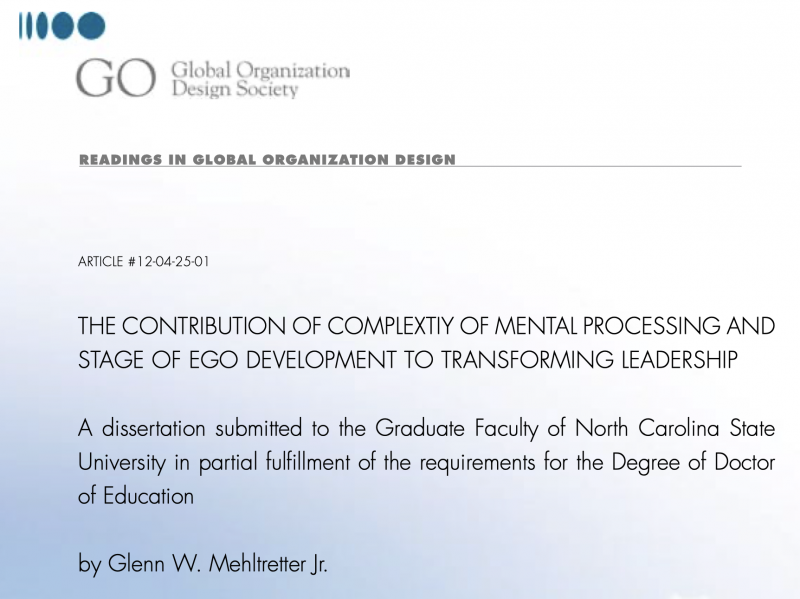The Contribution of Complexity of Mental Processing and Stage of Ego Development to Transforming Leadership
A dissertation submitted to the Graduate Faculty of North Carolina State university in partial fulfillment of the requirements for the Degree of Doctor of education - 1995

Obtain this book
To download a digital copy of this book for free
You need to register for a free GO Society web site account if you don't already have one at https://globalro.org/user/register. Then log into your account at https://globalro.org/user/login. Next, return to this page and you will be able to see and download the file.
Abstract
The purpose of this research was to determine if a manager’s performance as a transforming leader is related to that manager's method of interpreting information. The emerging term “meaning-making” was operationally examined using two variables: stage of ego development and relative complexity of mental processes. Relative complexity of mental processing is the difference between the manager's complexity of mental processing and the complexity of his or her assigned role when transformation is not required. As an ancillary issue, the relationship between stage of ego development and complexity of mental processing was also examined.
The variable, performance as a transforming leader, was determined by identifying each subject as having, or as not having, brought about a successful organizational transformation. Stage of ego development was measured using a written sentence completion test developed by Jane Loevinger. Complexity of mental processing was determined by applying a method developed by Elliott Jaques to observe the structure of thought in persons dealing with the complexities associated with doing work. Role complexity was measured using a methodology called time-span measurement also developed by Dr. Jaques.
The study showed strong evidence that transforming leaders possess complexity of mental processing at least one stratum above that required to operate at the level of complexity of their role were transformation not required. No evidence was found to indicate that a transforming leader must operate at a post-formal stage of ego development. Little evidence was found that the distribution of stage of ego development among transforming leaders was any different than the distribution among managers in general. Some evidence was found to support prior findings that there is a relationship between stage of ego development and complexity of mental processing.
This study provides a robust methodology for future research. A number of fertile avenues are indicated: relationship between stage of ego development and complexity of mental processing among postformal individuals, minimum levels of complexity of mental processing associated with successful transformation of organizations, and the character of transformation associated with the stage of ego development of a leader.
The purpose of this research was to determine if a manager’s performance as a transforming leader is related to that manager's method of interpreting information. The emerging term “meaning-making” was operationally examined using two variables: stage of ego development and relative complexity of mental processes. Relative complexity of mental processing is the difference between the manager's complexity of mental processing and the complexity of his or her assigned role when transformation is not required. As an ancillary issue, the relationship between stage of ego development and complexity of mental processing was also examined.
The variable, performance as a transforming leader, was determined by identifying each subject as having, or as not having, brought about a successful organizational transformation. Stage of ego development was measured using a written sentence completion test developed by Jane Loevinger. Complexity of mental processing was determined by applying a method developed by Elliott Jaques to observe the structure of thought in persons dealing with the complexities associated with doing work. Role complexity was measured using a methodology called time-span measurement also developed by Dr. Jaques.
The study showed strong evidence that transforming leaders possess complexity of mental processing at least one stratum above that required to operate at the level of complexity of their role were transformation not required. No evidence was found to indicate that a transforming leader must operate at a post-formal stage of ego development. Little evidence was found that the distribution of stage of ego development among transforming leaders was any different than the distribution among managers in general. Some evidence was found to support prior findings that there is a relationship between stage of ego development and complexity of mental processing.
This study provides a robust methodology for future research. A number of fertile avenues are indicated: relationship between stage of ego development and complexity of mental processing among postformal individuals, minimum levels of complexity of mental processing associated with successful transformation of organizations, and the character of transformation associated with the stage of ego development of a leader.





